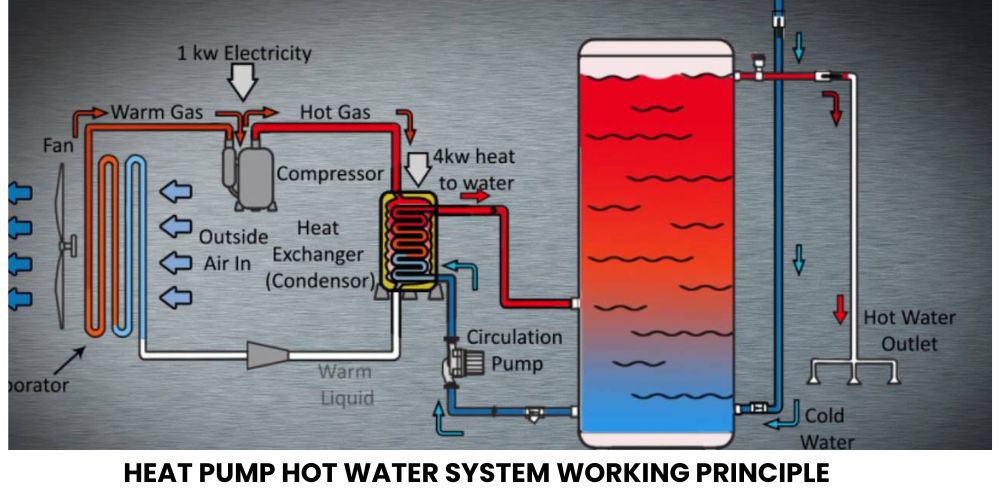Hot water systems are essential for daily life, from bathing to cleaning dishes and laundry. However, traditional water heaters are not energy-efficient and contribute to greenhouse gas emissions. In this blog, we will discuss the benefits, working principle, and price ( cost required to install ) of heat pump hot water systems, an innovative and eco-friendly alternative to traditional water heaters.
Heat pump hot water systems work by extracting heat from the surrounding air and transferring it to the water in the tank. This process requires less energy than heating the water using electricity or gas, which makes heat pump systems much more energy-efficient. According to the U.S. Department of Energy, a heat pump hot water system can save up to 50% on energy costs compared to traditional water heaters.

Moreover, heat pump hot water systems have a longer lifespan than traditional water heaters, which means less frequent replacements and lower maintenance costs. Although the initial cost of purchasing and installing a heat pump system may be higher than that of a traditional water heater, the long-term savings in energy costs and maintenance expenses can make up for the price difference.
Heat pump hot water systems are environmentally friendly and sustainable alternatives to traditional water heaters. They contribute to reducing greenhouse gas emissions and lowering carbon footprints. Traditional water heaters use fossil fuels such as natural gas, propane, or oil, which emit carbon dioxide and other pollutants into the atmosphere.
On the other hand, heat pump hot water systems use a small amount of electricity to transfer heat, which results in much lower greenhouse gas emissions. Moreover, the heat pump technology uses renewable energy from the air, making it a truly sustainable and eco-friendly alternative.
When installing a heat pump hot water system, there are a few things to consider.
First, heat pump systems require a certain amount of space around them to ensure proper airflow and ventilation. Therefore, it’s crucial to choose the right location for installation.
Second, heat pump hot water systems require periodic maintenance to ensure optimal performance and longevity. Regular maintenance includes checking and cleaning the air filter, inspecting the refrigerant level, and testing the electrical connections.
Finally, heat pump hot water systems have a longer lifespan than traditional water heaters but may require occasional repairs. It’s essential to hire a professional technician with experience repairing and maintaining heat pump hot water systems.
The cost of a basic heat pump hot water system installation can range from $2,500 to $4,000, while more powerful systems can cost up to $6,000. Although the upfront cost may be higher than traditional electric water heaters, the long-term savings on energy bills make it a valuable investment. Most heat pump hot water systems offer generous warranties for added peace of mind. Choose a system that suits your household and budget for reliable and energy-efficient hot water.
In conclusion, heat pump hot water systems are an energy-efficient and environmentally friendly alternative to traditional water heaters. They offer significant cost savings in the long run and contribute to reducing greenhouse gas emissions. Although they require proper installation, maintenance, and occasional repairs, heat pump hot water systems are a durable and reliable technology for hot water needs.
If you’re considering purchasing a heat pump hot water system, consult with professional technicians like Craig’s Gas & Plumbing to determine if it’s the right choice for your home.
By choosing this innovative and eco-friendly technology, you’ll contribute to a more sustainable future while enjoying the benefits of energy-efficient hot water.
Also read: Choosing the Best Hot Water System: Efficiency, Brands, and Fit for Your Home
